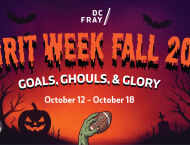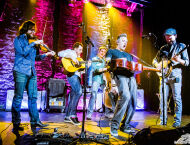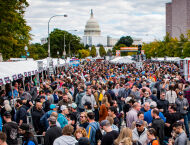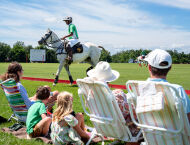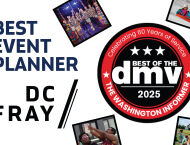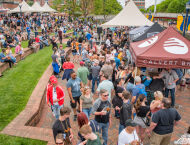Music
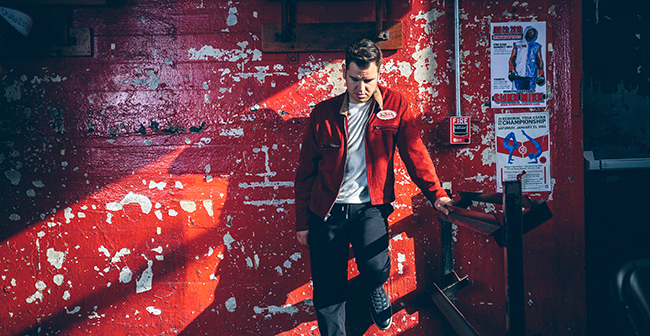 Photo: Roberto Chamorro
Photo: Roberto Chamorro
Whole Lotta Soul: Eli “Paperboy” Reed Wears Influences on His Sleeve
March 30, 2019 @ 12:00am
Full disclosure: I’m a total sucker for a retro-inspired sound. Add crooning vocals, soulful instrumentation and thoughtful lyrics to the mix, and I’m sold.
A girlfriend introduced me to soul singer Eli “Paperboy” Reed about a decade ago (fun fact: she went to the same high school as Reed in a Boston suburb and was super proud of this fact) and I was immediately smitten with his modern-day take on the genre. Since then, I’ve seen him play DC venues multiple times – most memorably with a full brass band at Rock & Roll Hotel – and listened to his records incorporate everything from blues and gospel to R&B and pop sensibilities. But soul always remains the foundation of his signature sound.
With a new album, 99 Cent Dreams, out on April 12 – produced in Memphis by Matt Ross-Spang with Ken Coomer (Wilco) on drums – and a tour that includes a stop at The Hamilton Live on May 4, I finally had the opportunity to pick the artist’s brain about reinventing what has come before and making it his own. We chatted on the phone recently when he was at home in Brooklyn doing some spring cleaning about life as the father of a two-year-old, how DC has the best Ethiopian food (duh) and what soul music means to him.
On Tap: I want to start with a question that sometimes mildly offends musicians when I ask it, although I’m not completely sure why.
Eli “Paperboy” Reed: [Laughs] I’m very excited to hear what the question is now.
OT: I find that so much of the music I love is a reinvention of older sounds. With soul being the backbone of yours, and as a musician on the soul scene for more than a decade now, how do you reinvent that sound with each new album and keep it fresh and true to you?
EPR: I think it’s a good question. I think if you had asked me 10 years ago when I started out, I might’ve been one of the ones who was offended. I think that I’ve come around to the idea that I don’t mind wearing my influences on my sleeve. I hope at this point in my career that I’ve been able to make records that people can identify [with] sounding like me. Everybody takes from something. I don’t think there’s any point in trying to deny it or be upset about being called a revivalist or whatever. I guess just at the heart of it, the point is that people want to put your records on and listen to them, you know? I think that my goal has always been to make music that I want to listen to and love.
OT: I would for sure say you have a signature sound that’s all your own. Your music feels like something I can dance to, and Top 40 isn’t that for me, do you know what I mean?
EPR: Sure, well that’s great. I think that’s also part of the goal for people like myself or any of the other artists that are clearly very influenced by 60s soul music is to provide their listeners with something they can enjoy that they might not otherwise be able to find on the radio or at a show. The fact that you can come out and see me play live and enjoy yourself and dance is something you can’t do with a record that’s 50 years old.
OT: Very true. So tell me about 99 Cent Dreams. How long was this record in the making?
EPR: I have a daughter now who’s two-and-a-half and I had this idea that I was going to write a lot of this record while I was home on paternity leave and that didn’t really happen [laughs]. Once she started daycare, I buckled down in earnest to write the songs. Thankfully, there’s a really amazing community of musicians and singers and songwriters here in Brooklyn, and a lot of people were able to just come over to the house and sit down with guitars or on the piano and write. It was a nice chunk of time that I was able to set aside at home with my family and also work with a lot of people who I really respect. It was a very productive time period for me.
OT: Did you draw on home life – being a parent and a husband – at all during the songwriting process?
EPR: Absolutely. I think these are songs that are really representative of my current situation and how I feel about my wife and my family. I feel like it’s a more settled record, that’s for sure. But in a good way. And I don’t think that makes it any less soulful or any less emotional. I think it’s just a different kind of feeling that I’m drawing on.
OT: I have a two-and-a-half-year-old as well, and I grew up playing classical piano. I’ve been wondering when to start teaching him how to read and play music. As a professional musician, have you already started thinking about teaching your daughter how to play an instrument?
EPR: We play music together in the house all the time. I’m not really trying to do the lessons thing. For me, the idea is just to have [music] be around, and I want her to pick up on things that she likes to do. I want to let her figure it out for herself. As long as we can listen to music together, that’s enough for me.
OT: Are there any songs on the record that are particularly close to your heart or that you think listeners will really connect with?
EPR: I like “Tryin’” a lot. It’s a song that I wrote from my wife’s perspective. She’s the one in the family with the 9 to 5 job, and sometimes it’s a tough life to have a 9 to 5 gig and try to come home and be a parent, or a husband or a wife.
OT: When did you have that moment of, “Okay, I’m all in, I’m doing this” about soul? Why was it the genre that you connected with the most?
EPR: Soul music is kind of the quintessence of all the things that I love – blues and R&B and jazz and gospel and country music – put through the lens of a pop format. That’s something I could wrap my head around as a performer: how to do that and do it in a way that I felt was original and that people would be interested in hearing.
OT: Do you feel like your sound has changed a lot over the past decade in terms of sticking to soul, or even your live performances?
EPR: I had a period where I made a pop record that came out on Warner Bros. and for one reason or another, it didn’t really connect. Then I kind of went the opposite direction and made the My Way Home album, which is more [of a] gospel record. I felt like I had to do something that was just for me. I’m incredibly proud of that record. It felt cathartic and necessary. When it came time to make this album, I wanted to do it in a little bit more of a controlled and thoughtful way. I feel like it became what I wanted it to be, for sure.
OT: Are there any sounds or genres you’d like to explore or pursue in the next few years? What’s next for you?
EPR: I’m still buying gospel records all the time. I love gospel music. It’s an endlessly deep well of inspiration for me. Man, there’s so much, you know? But for the most part, I come back to the same things because I think there’s so much to discover in the genres that I love. There’s still records that knock me out. I’m finding new music every day and it’s still amazing how much good stuff there is that is undiscovered.
OT: Who would be your dream co-bill for a future tour?
EPR: Probably Beyoncé [laughs]. I think Beyoncé pretty much takes the cake for all of it.
OT: What’s your favorite part of playing shows in DC?
EPR: Ethiopian food, man. Ethiopian food in DC is the best. There’s a particular place and I’m forgetting the name, but every time we play in DC, I stop in Alexandria at this tiny Ethiopian place in a strip mall that’s open until 2 o’clock in the morning. We go there after every show. It’s SO good.
Eli “Paperboy” Reed plays The Hamilton Live on Saturday, May 4. Doors open at 6:30 p.m., show starts at 8 p.m. Tickets $15-$20. For more information about the performance, visit www.live.thehamiltondc.com. Learn more about Reed at www.elipaperboyreed.com and follow him @elipaperboyreed.
The Hamilton Live: 600 14th St. NW, DC; 202-769-0122; www.live.thehamiltondc.com


